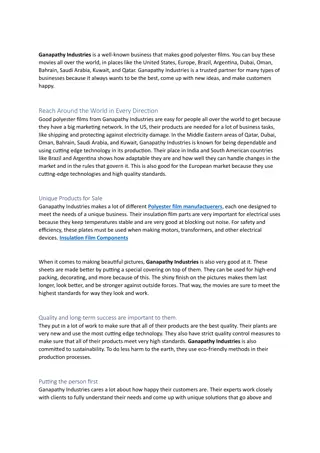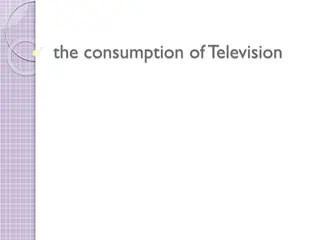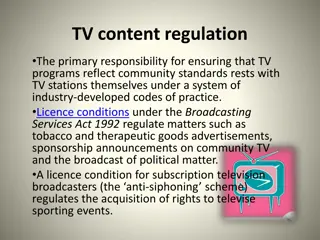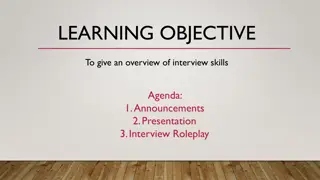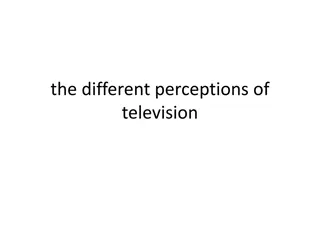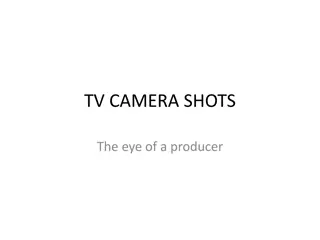Gender Equity Policies in Film and Television Analysis Interview
Explore the evolution of gender equity in the film and television industries of Canada, Germany, and the UK over the past decade. Dive into the success, challenges, and potential interventions for enhancing gender equity. Uncover expert insights on the industry's commitment to gender equality and radical solutions for achieving fundamental shifts.
Download Presentation

Please find below an Image/Link to download the presentation.
The content on the website is provided AS IS for your information and personal use only. It may not be sold, licensed, or shared on other websites without obtaining consent from the author. Download presentation by click this link. If you encounter any issues during the download, it is possible that the publisher has removed the file from their server.
E N D
Presentation Transcript
Gender Equity Policies in Film and Television Expert interview
Introduction For the GEP Analysis Project we ve looked at policies and interventions that address gender equity issues such as Women s under-representation in the workforce. Women receiving less pay and other rewards. Women having fewer creative, managerial and financial opportunities than men. Women experiencing sexual harassment and bullying. Typical examples of such policies or interventions for Canada/Germany/UK include diversity quotas, funding regulations, rules for recruitment and a pledge or charter. In this interview we d like to hear your take on what has happened with gender equity in Canadian/German/UK film. We d like to talk to you as an industry expert, not as a representative of your employer. Some of the questions you ll be familiar with, others might push you a bit and make you think. There are no right or wrong answers to any of them, we are really just interested in what you make of the issues. Q. Any questions before we begin? START RECORDING
1. What has happened? Q. Over the past 10 years, would you say the film industry in Canada/Germany/UK has tried to improve gender equity, and if so, how? Rephrasing: When you arrived, how & where was gender equity visible in Canadian/German/UK film?
2. Has it been successful? Q. Do you think gender equity policies in Canadian/German/UK film have been successful in the past 10-15 years? Prompts: Has there been progress? What makes you say there has/hasn t been progress? Q. What works well, currently (if anything)? What doesn t?* Q. How strongly do you think Canadian/German/UK film, as an industry, is genuinely committed to improving gender equity? On a scale of 1 to 10 (with 1 not at all and 10 very much), where would you say that commitment is (roughly)?
3. Magic wand question Q. This is our magic wand question: Imagine you could bring into being any policy or intervention, by anyone, what do you think would create a fundamental shift in terms of gender equity? We are open all radical suggestions or examples. (Rephrased question if needed, i.e. if interviewee struggles to get head around magic wand idea: Ideally, who needs to do what in Canadian/German/UK film to improve gender equity?) Q. For your magic wand solution, what would you need to see, what would need to happen, for you to know that your solution worked? If the magic wand policy has not been implemented: why do you think this policy has not been implemented? If the magic wand policy has been implemented: what were the factors that limited its success?
4. Quick fire round: imagining interventions I d like to play a quick fire round of what would work? with you. I will show you a slide with a type of intervention. I d like your expert take on whether this type of intervention is worth thinking about. Alongside each intervention there s going to be four options to choose from. NB we re not after nuance here just after a really general take. START SCREEN SHARE
1. To improve gender equity, would it be useful to have more interventions that improve women s training & qualification, e.g. mentoring, training, shadowing. Noticeable improvements but not a step change Would really shift the dial Might help somewhat No point
2. To improve gender equity, would it be good to have more interventions that add women in key positions e.g. through targets, quotas, gender-based financial incentives. Noticeable improvements but not a step change Would really shift the dial Might help somewhat No point
3. To improve gender equity, would it be worth focusing on interventions that require or reward companies & organisations to change their own practice, e.g. via diversity checklists or standards. Noticeable improvements but not a step change Would really shift the dial Might help somewhat No point
5. Policy objects Our research has identified several areas of industry practice in which gender equity policy had tried to drive change. Work and employment practices Complaints and grievances Funding and budgets Access and recruitment Training Screening, exhibition and audiences On-screen representation Awards and recognition Distribution Q. Which of these areas have received the most attention, you think? Q. Who has driven that focus and why? Q. Do you think the right area(s) are receiving attention? Why/why not?
6. Policy agents END SCREEN SHARE Q. If you think about the organisations in Canadian/German/UK film that play a key role in improving gender equity, would you say they are effective in bringing about change? Prompts: If yes: What is it that makes them perform that role well? If no: Why aren t they driving change? What gets in the way?
7. Compliance & enforceability Q. Thinking about how industry engage with the policies, do you think that engagement genuine or box- ticking? Q. Our analysis showed that for many policies it is possible to comply on the face of it, but in a way that goes against the spirit of the policy. Have you seen examples of that? Prompts: How widespread would you think that is? Why do you think it occurs? Q. Do you think current gender equity policy in Canadian/German/UK film is enforceable enough to deliver change ?
8. Policy logics We ve looked at how policies make the case for gender equity this might include the business case, cultural value (art and creativity), social value (cohesion, citizenship), moral/ethical reasons and/or legal/regulatory reasons. Our research has reviewed gender equity policies from Canada/Germany/UK that were published over the past 20 years to try and understand what rationale or reason policies mentioned for addressing issues of gender inequity. I m now going to share my screen and show you a graph that illustrates findings from our policy review Q. Do you think this graph is a reasonably fair picture of where gender equity policy in Canadian/German/UK film has come from in the past 10 or so years? Q. If we tried to understand the motivation for gender equity policy in Canadian/German/UK film, what would be missing from this picture? Are there other reasons why people would pursue gender equity?
8. Policy logics Canada 10 *Multiple response options were permitted. 9 8 7 Number of policies 6 5 4 3 2 1 0 Business case Social value (cohesion, citizenship) Cultural value (art and creativity) Legal/regulatory reasons Moral/ethical reasons Q. Do you think this graph is a reasonably fair picture of where gender equity policy in Canadian/German/UK film has come from in the past 10 or so years? Q. If we tried to understand the motivation for gender equity policy in Canadian/German/UK film, what would be missing from this picture? Are there other reasons why people would pursue gender equity?
8. Policy logics - Germany 14 *Multiple response options were permitted. 12 10 Number of polices 8 6 4 2 0 Moral/ethical reasons Cultural value (art and creativity) Business case Social value (cohesion, citizenship) Legal/regulatory reasons Q. Do you think this graph is a reasonably fair picture of where gender equity policy in Canadian/German/UK film has come from in the past 10 or so years? Q. If we tried to understand the motivation for gender equity policy in Canadian/German/UK film, what would be missing from this picture? Are there other reasons why people would pursue gender equity?
8. Policy logics - UK 35 *Multiple response options were permitted. 30 25 Number of policies 20 15 10 5 0 Moral/ethical reasons Cultural value (art and Social value (cohesion, citizenship) Business case Legal/regulatory reasons creativity) Q. Do you think this graph is a reasonably fair picture of where gender equity policy in Canadian/German/UK film has come from in the past 10 or so years? Q. If we tried to understand the motivation for gender equity policy in Canadian/German/UK film, what would be missing from this picture? Are there other reasons why people would pursue gender equity?
9. Zooming out Q. Zooming out a bit, what is your take, why is gender equity "on the agenda" in Canadian/German/UK film? Prompts: Has the conversation about gender equity changed over the past 15 years? Q. What other than policy in the sense we have discussed it here would improve gender equity in Canadian/German/UK film? Q. Anything else that you think is relevant and that we haven t spoken about?





